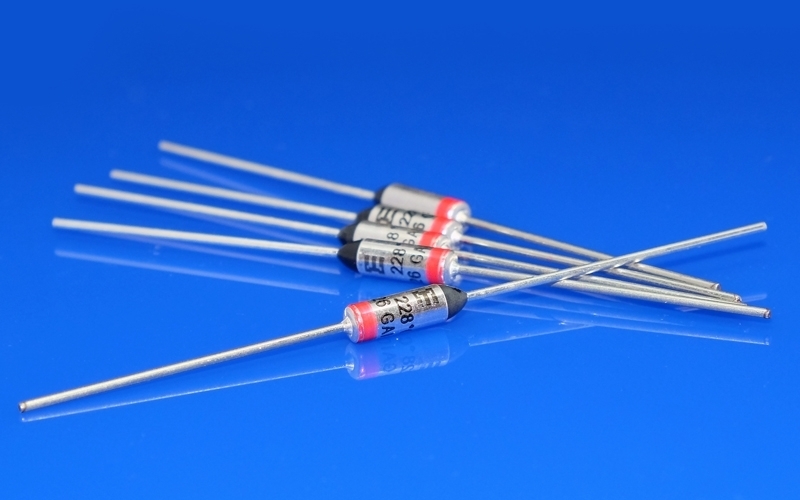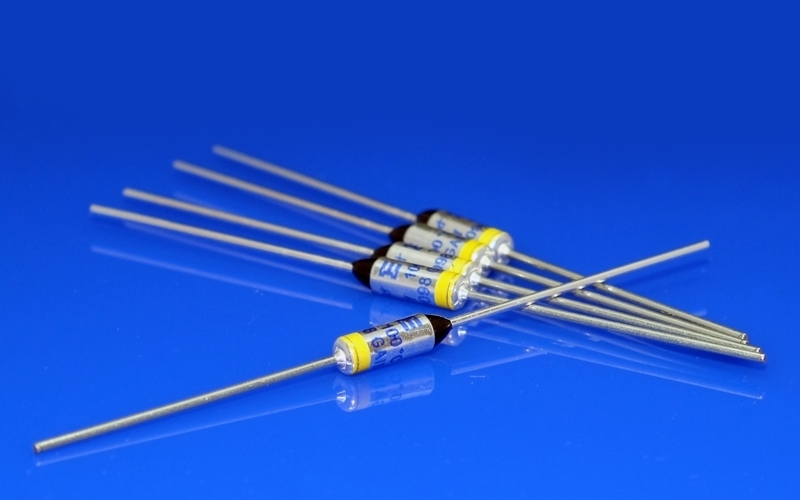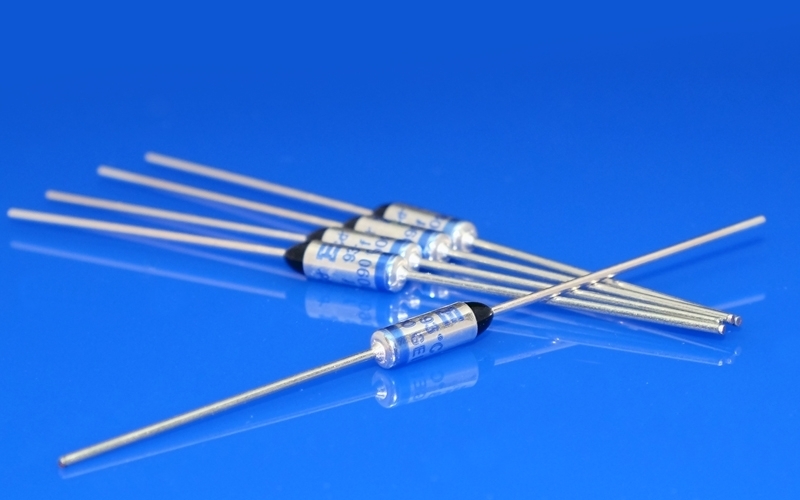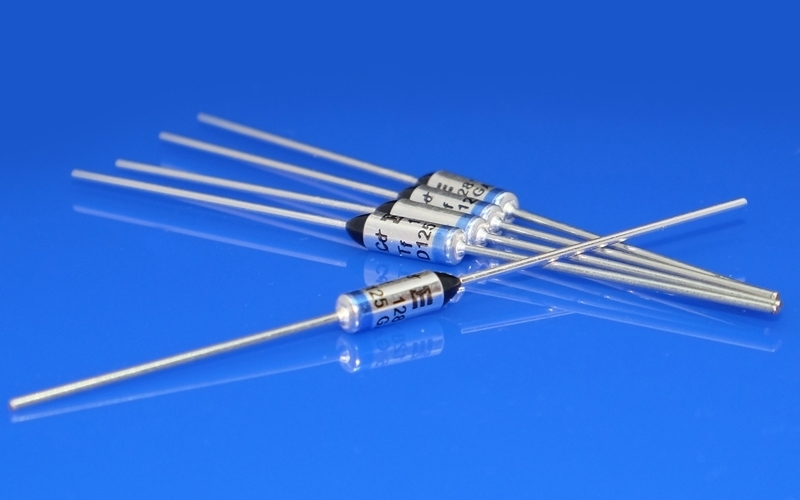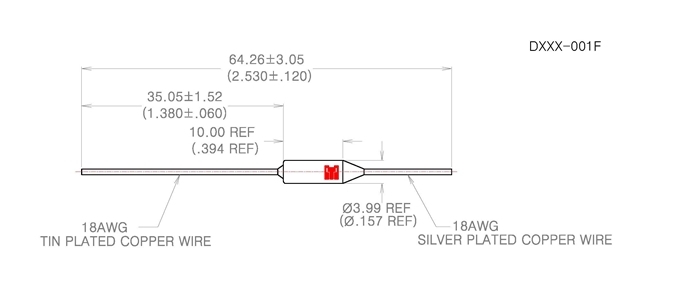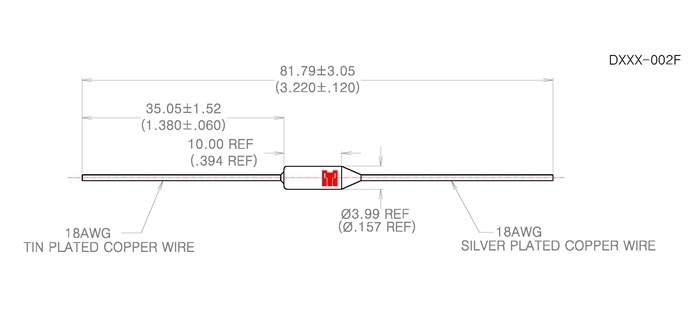D SERIES TEMPERATURE RATING
| MODEL | Tf (FUNCTIONING OPEN TEMPERATURE) | Th (HOLDING TEMPERATURE) | Tm (MAXIMUM OVERSHOOT TEMPERATURE) | SAFETY APPROVAL | |||||||
| ℃ | ℉ | ℃ | ℃ | ℃ | |||||||
| D070 | 72 | 162 | +0/-4℃ | 57 | 115 | UL, C-UL, VDE, NEMKO, SEMKO, CCC, PSE | |||||
| D076 | 77 | 171 | +0/-4℃ | 62 | 150 | ||||||
| D081 | 84 | 183 | +0/-4℃ | 69 | 115 | ||||||
| D088 | 90 | 194 | +0/-4℃ | 75 | 150 | ||||||
| D090 | 93 | 199 | +0/-6℃ | 78 | 315 | ||||||
| D098 | 100 | 212 | +0/-4℃ | 85 | 130 | ||||||
| D103 | 104 | 219 | +0/-4℃ | 89 | 315 | ||||||
| D108 | 109 | 228 | +0/-4℃ | 94 | 215 (VDE, CCC,SEMKO,NEMKO) 315 (UL,C-UL) |
||||||
| D110 | 110 | 230 | +0/-5℃ | 95 | 150 | ||||||
| D115 | 117 | 243 | +0/-4℃ | 102 | 130 | ||||||
| D118 | 121 | 250 | +0/-6℃ | 106 | 315 | ||||||
| D125 | 128 | 262 | +0/-4℃ | 113 | 300 (VDE,SEMKO,NEMKO) 180 (UL, C-UL, CCC) |
||||||
| D139 | 141 | 286 | +0/-6℃ | 126 | 170 (VDE,SEMKO,NEMKO) 230 (UL, C-UL, CCC) |
||||||
| D142 | 144 | 291 | +0/-6℃ | 129 | 315 (VDE,SEMKO,NEMKO) 240 (UL, C-UL, CCC) |
||||||
| D156 | 156 | 313 | +0/-5℃ | 141 | 170 | ||||||
| D165 | 169 | 336 | +0/-6℃ | 154 | 270 (120V), 250 (250V) (VDE,SEMKO,NEMKO) 270(120V), 210 (250V) (UL, C-UL, CCC) |
||||||
| D172 | 172 | 342 | +0/-5℃ | 157 | 280 | ||||||
| D181 | 184 | 363 | +0/-4℃ | 169 | 210 | ||||||
| D192 | 192 | 378 | +0/-5℃ | 182 | 250 | ||||||
| D213 | 216 | 421 | +0/-4℃ | 201 | 375 | ||||||
| D226 | 228 | 442 | +0/-6℃ | 212 | 260(120V) 240(250V) | ||||||
| D230 | 230 | 446 | +0/-6℃ | 212 | 375 | ||||||
| D242 | 240 | 464 | +0/-6℃ | 215 | 375 | ||||||
| D257 | 257 | 495 | +0/-5℃ | 220 | 375 | ||||||
Tf (FUNCTIONING OPEN TEMPERATURE)
The maximum temperature at which the thermal cut offs changes its state of conductivity
to open circuit with detection current as the only load.
Th (HOLDING TEMPERATURE)
The maximum temperature at which,when applying no electrical load to the thermal cut offs,
the state of conductivity will not change during a period of 168 hours.
Tm (MAXIMUM OVERSHOOT TEMPERATURE)
The maximum temperature of thermal cut offs, having changed its state of conductivity, can be maintained for 10 minutes
during which its mechanical and electrical properties will not be impaired.
ELECTRICAL RATINGS
AC Electrical Rating
Standard Ratings (Except specific type listed below from *1 to *6)
| SAFETY APPROVAL | VOLTAGE (AC) | RESISTIVE CURRENT | |
| (Vr) | (Ir) | (Ib) | |
| UL, C-UL, VDE, NEMKO, SEMKO, CCC | 120V / 250V | 16.7A / 16.7A | 25A / 25A |
*1 D090
| SAFETY APPROVAL | VOLTAGE (AC) | RESISTIVE CURRENT | |
| (Vr) | (Ir) | (Ib) | |
| UL, C-UL, VDE, CCC | 120V / 250V | 16.7A / 16.7A | 25A / 25A |
| NEMKO, SEMKO | 120V / 250V | 16.7A / 10A | 25A / 15A |
*2 D115
| SAFETY APPROVAL | VOLTAGE (AC) | RESISTIVE CURRENT | |
| (Vr) | (Ir) | (Ib) | |
| UL, C-UL, VDE, NEMKO | 120V / 250V | 16.7A / 16.7A | 25A / 25A |
| CCC, SEMKO | 120V / 250V | 16.7A / 10A | 25A / 15A |
*3 D139
| SAFETY APPROVAL | VOLTAGE (AC) | RESISTIVE CURRENT | |
| (Vr) | (Ir) | (Ib) | |
| UL, C-UL, VDE, NEMKO, SEMKO, CCC | 120V | 16.7A | 25A |
*4 D172
| SAFETY APPROVAL | VOLTAGE (AC) | RESISTIVE CURRENT | |
| (Vr) | (Ir) | (Ib) | |
| UL, C-UL, VDE, CCC, NEMKO | 120V / 250V | 16.7A / 16.7A | 25A / 25A |
| SEMKO | 120V / 250V | 16.7A / 10A | 25A / 15A |
*5 D192
| SAFETY APPROVAL | VOLTAGE (AC) | RESISTIVE CURRENT | |
| (Vr) | (Ir) | (Ib) | |
| UL, C-UL, NEMKO | 120V / 250V | 16.7A / 16.7A | 25A / 25A |
| VDE, CCC, SEMKO | 120V / 250V | 16.7A / 10A | 25A / 15A |
*6 D213
| SAFETY APPROVAL | VOLTAGE (AC) | RESISTIVE CURRENT | |
| (Vr) | (Ir) | (Ib) | |
| UL, C-UL | 120V / 250V | 16.7A / 16.7A | 25A / 25A |
| VDE, SEMKO, NEMKO, CCC | 120V / 250V | 16.7A / 12A | 25A / 18A |
*7 D156, D257
| SAFETY APPROVAL | VOLTAGE (AC) | RESISTIVE CURRENT | |
| (Vr) | (Ir) | (Ib) | |
| UL, C-UL, VDE, SEMKO | 120V / 250V | 15A / 10A | 22A / 15A |
*8 DXXX PSE Electrical Rating
| SAFETY APPROVAL | VOLTAGE (AC) | RESISTIVE CURRENT |
| (Vr) | (Ir) | |
| PSE | 125V | 15A |
DC Electrical Rating
Standard Ratings (Except specific type listed below **)
| SAFETY APPROVAL | VOLTAGE (DC) | RESISTIVE CURRENT | |
| (Vr) | (Ir) | (Ib) | |
| UL, C-UL, VDE, SEMKO, NEMKO | 12V / 24V | 10A / 5A | 15A / 7.5A |
** D192, D226
| SAFETY APPROVAL | VOLTAGE (DC) | RESISTIVE CURRENT | |
| (Vr) | (Ir) | (Ib) | |
| UL, C-UL, VDE, SEMKO, NEMKO, CCC | 12V / 24V | 10A / 5A | 15A / 7.5A |
<Notes> All products shall comply with IEC-60691 - FOR ED. 3.0 AMENDMENT 2.


